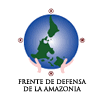Ecuador Bishop Criticizes Chevron for Its Role in World's Largest Oil-Related Catastrophe
Seeks Assistance of U.S. Conference of Catholic Bishops As Humanitarian Crisis Worsens

Amazon Defense Coalition
20 October 2010 - FOR IMMEDIATE RELEASE
Contact: Karen Hinton at +1.703.798.3109
In another blow to Chevron's image, a prominent Bishop who lives in the area of Ecuador where Chevron is embroiled in a multi-billion environmental lawsuit, has strongly criticized the oil giant for harming local residents with toxic contamination, it was learned today.
Gonzalo Lopez Marañon, Bishop of Seleuciana, made the criticism in a letter to the U.S. Conference of Catholic Bishops sent on "behalf of dozens of indigenous and farmer communities" in Ecuador who live in the area of rainforest where Chevron operated a large oil concession from 1964 to 1990. The full text of the letter can be found here.
Chevron is accused in the lawsuit, brought by 30,000 rainforest residents, of deliberately dumping 18 billion gallons of toxic waste into rivers and streams in the area where the Bishop ministers to farmers and the surviving members of indigenous groups.
In the letter, Bishop Maranon wrote that "thousands of impoverished men, women and children live in an area of 2,000 square miles ravaged by oil pollution. This pollution, and its devastating health effects on our people, is a direct result of decades of oil production by the Texaco oil company [now Chevron] and its policy of storing oil sludge in almost 1,000 open and unlined pits. Over a period of decades, the company also pumped more than 18 billion gallons of toxic water into the Amazon's rivers."
The Bishop continued: "Chevron has made clear in official public statements that it accepts no responsibility for the pollution and death caused by Texaco, or the many pollution-connected diseases that continue to afflict our people."
The letter comes in the wake of a new damages assessment from a team of American technical experts that puts Chevron's potential liability in the tens of billions of dollars for what is believed to be the world's largest oil-related disaster. The new assessment attributes a large portion of the damages to thousands of potential cancer deaths, according to court documents filed Sept. 16 by lawyers for the Amazonian communities.
Evidence in the lawsuit demonstrates that the pollution at each of Chevron's 378 former oil production sites far exceeds Ecuadorian and U.S. norms designed to protect human health. Expert reports and peer-reviewed studies before the court also show that Chevron's contamination has led to dramatically increased rates of cancer and poisoned an area roughly the size of Rhode Island.
Chevron claims it was given a legal release by the government of Ecuador in 1995, but residents of the affected Amazon communities say the release was obtained fraudulently after a sham clean-up and in any event does not apply to their private claims.
In referring to Chevron's pollution, the Bishop's letter stated: "We say, simply, that this must not stand. As the Holy Father recently said in Caritas in Veritatae:
Let us hope that the international community and individual governments will succeed in countering harmful ways of treating the environment. It is likewise incumbent upon the competent authorities to make every effort to ensure that the economic and social costs of using up shared environmental resources are recognized with transparency and fully borne by those who incur them, not by other peoples or future generations...."
The Bishop said it is his "hope and prayer" that the U.S. Conference of Catholic Bishops "will devote its great skill and resources to educating American Catholics, governmental policy-makers and the media about the plight of our people and their 17-year pursuit of justice from one of the world's ten biggest corporations."
Chevron has been on the receiving end in recent months of several letters critical of its Ecuador pollution problem.
The oil giant's effort to subpoena video outtakes from independent filmmaker Joe Berlinger – who made a documentary film about the case – drew fire from Robert Redford, Bill Moyers, Mikhail Gorbachov, Leonardo DiCaprio, and other well-known artists and political figures.
In July, 15 members of the U.S. Congress wrote Ron Kirk, United States Trade Representative, to express concern about Chevron's efforts to withhold U.S. trade preferences from Ecuador as retaliation for the lawsuit. Kirk also received a similar letter at the time from The Most Reverend Howard J. Hubbard of the U.S. Conference of Catholic Bishops.
Chevron also has been under attack over its Ecuador policy from several U.S.-based environmental groups, including the Sierra Club, Rainforest Action Network, and Amazon Watch.